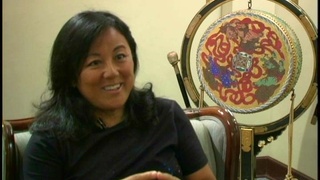Interviews
“Agreement of silence”
I find it true among the veterans - now, even among ourselves - I think combat is such a horrible experience that few if ever, want to talk about what happens in combat. And so there is this…agreement of silence. And not only do they not talk to their wives, their children, or anybody else, but we don’t even talk to each other, you see.
We do get together, we love to get together, we’re extremely comfortable together. You know, 24 hours a day in combat seems like eternity. You know, when you don’t know when you’re going to die any moment, you know, life could come to an end and people are asking you to do what is normally almost an impossible task, at peace time no one would ask you to do, and you’re constantly…that pressure to achieve something that’s almost physically impossible in great, great danger. You learn to depend upon each other, so much so that when you haven’t seen somebody even for five, ten, fifteen, twenty years and you see them again, not only are you overjoyed, but nothing has changed.
Date: August 28, 1995
Location: California, US
Contributed by: Watase Media Arts Center, Japanese American National Museum
Explore More Videos

Wanting to take a stand
(1916-2010) draft resister, helped form the Heart Mountain Fair Play Committee

Ostracized by the camp newspapers
(1916-2010) draft resister, helped form the Heart Mountain Fair Play Committee

On trial for draft evasion
(1916-2010) draft resister, helped form the Heart Mountain Fair Play Committee

Draft resisters sent to jail
(1916-2010) draft resister, helped form the Heart Mountain Fair Play Committee

Fair Play Committee charged with conspiracy
(1916-2010) draft resister, helped form the Heart Mountain Fair Play Committee

Meeting other Americans in jail
(1916-2010) draft resister, helped form the Heart Mountain Fair Play Committee

Would do the same again
(1916-2010) draft resister, helped form the Heart Mountain Fair Play Committee

Arrested in camp for trying to leave
(1916-2010) draft resister, helped form the Heart Mountain Fair Play Committee

Different feelings from veterans about the draft resisters
(1916-2010) draft resister, helped form the Heart Mountain Fair Play Committee

Unable to work when the war broke out
(1913-2013) Doctor specializing in obstetrics in Southern California

Traumatic experiences before camp
(1913-2013) Doctor specializing in obstetrics in Southern California

Joining the hospital unit in Santa Anita Race Track
(1913-2013) Doctor specializing in obstetrics in Southern California

Lost respect for the flag after incarceration
(1913-2013) Doctor specializing in obstetrics in Southern California

“Everybody went in like sheep”
(1913-2013) Doctor specializing in obstetrics in Southern California

Necessary apologies (Spanish)
(b. 1962) Peruvian Poet, Okinawan descendant
